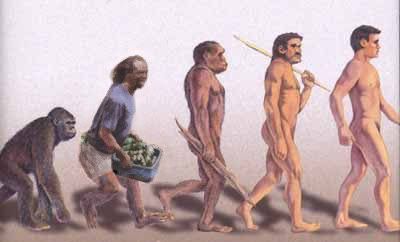
Detlev Arendt (left), Florian Raible and Peer Bork.
(Photo Credit: Marietta Schupp, Photolab, EMBL
Heidelberg)
Posted on 11/27/2005 7:11:52 AM PST by Pharmboy
Species evolve at very different rates, and the evolutionary line that produced humans seems to be among the slowest. The result, according to a new study by scientists at the European Molecular Biology Laboratory [EMBL], is that our species has retained characteristics of a very ancient ancestor that have been lost in more quickly-evolving animals. This overturns a commonly-held view of the nature of genes in the first animals. The work appears in the current issue of the journal Science.

Detlev Arendt (left), Florian Raible and Peer Bork.
(Photo Credit: Marietta Schupp, Photolab, EMBL
Heidelberg)
Genes hold the recipes for proteins. The genes of animals usually contain extra bits of DNA sequence, called introns – information which has to be removed as cells create new molecules. The number of introns in genes, however, varies greatly among animals. While humans have many introns in their genes, common animal models such as flies have fewer. From an evolutionary perspective, it was long assumed that the simpler fly genes would be more ancient. The current study reveals the opposite: early animals already had a lot of introns, and quickly-evolving species like insects have lost most of them.
To discover what early animals were like, scientists usually compare their descendents. This is difficult when comparing distantly-related animals such as humans and flies. In these cases, it helps to look at living organisms that have preserved many features of their ancestors. Detlev Arendt's group is doing this with a small marine worm called Platynereis dumerlii. "Similar animals are already found in the earliest fossils from the Cambrium, about 600 million years ago," Arendt explains, "arguing that Platynereis could be something like a 'living fossil'." This makes it an ideal model for evolutionary comparisons to find out what the common ancestors of humans, flies and worms were like."
Until quite recently, such comparisons could only be made by looking at physical characteristics such as the structure of bones, teeth, or tissues. But DNA sequencing now permits scientists to make comparisons of the genetic code and read evolutionary history from it. An international consortium involving researchers from EMBL, the UK, France and the United States has now sequenced a part of the Platynereis genome. "The fraction of Platynereis genes we have been able to look at tells a very clear story," says researcher Florian Raible, who performed most of the computer analyses. "The worm’s genes are very similar to human genes. That's a much different picture than we've seen from the quickly-evolving species that have been studied so far."
Raible is member of both Arendt's group and a second EMBL lab, that of Peer Bork, whose specialty is analyzing genomes by computer. "Human genes are typically more complex than those of flies," explains Bork. "Classicallystudied species like flies have far fewer introns, so many scientists have believed that genes have become more complex over the course of evolution. There have already been speculations that this may not be true, but proof was missing. Now we have direct evidence that genes were already quite complex in the first animals, and many invertebrates have reduced part of this complexity."
Not only are the introns there – the team also discovered that their positions within genes have been preserved over the last half a billion years." This gives us two independent measurements that tell the same story," Raible explains. "Most introns are very old, and they haven't changed very much in slowly-evolving branches of life, such as vertebrates or annelid worms. This makes vertebrates into something like 'living fossils' in their own right."
The discovery that Platynereis also represents a slowlyevolving branch of animal life has important implications for the study of humans. "We've already learned an incredible amount about humans from studies of the fly," Arendt says. "The marine worm might well give us an even better look at important conserved processes. Another thing that this has shown us is that evolution is not always about gain; the loss of complexity can equally be an important player in evolution."
Source article: Vertebrate-type intron-rich genes in the marine annelid Platynereis dumerilii F. Raible, K. Tessmar-Raible, K. Osoegawa, P. Wincker, C. Jubin, G. Balavoine, D. Ferrier, V. Benes, P. de Jong, J. Weissenbach, P. Bork and D. Arendt. Science, 25 November 2005
Ping...
True. . .but as to the 'Old Lady'. . .we still know 'why'. . .she swallowed a fly. . .

|
|
Well... |
This helps me understand a few people.

Here's a dog with human-like genes.
What a waste of makeup.
The cause of my slow learning is revealed.
Excellent...
Perhaps homo sapiens emerged from the mud as an intelligent design, preceding simpler organisms?
Amazing.
"Earliest Animals Had Human-like Genes"
That could explain a lot.
The rate at which they evolve into other KINDS of animals is zero.

Thanks for the ping.
Now THAT's funny...
Oh man! LOL!!! What a mug!
There. Fixed it for ya.
(mouth watering in fond remembrance.....)
Disclaimer: Opinions posted on Free Republic are those of the individual posters and do not necessarily represent the opinion of Free Republic or its management. All materials posted herein are protected by copyright law and the exemption for fair use of copyrighted works.